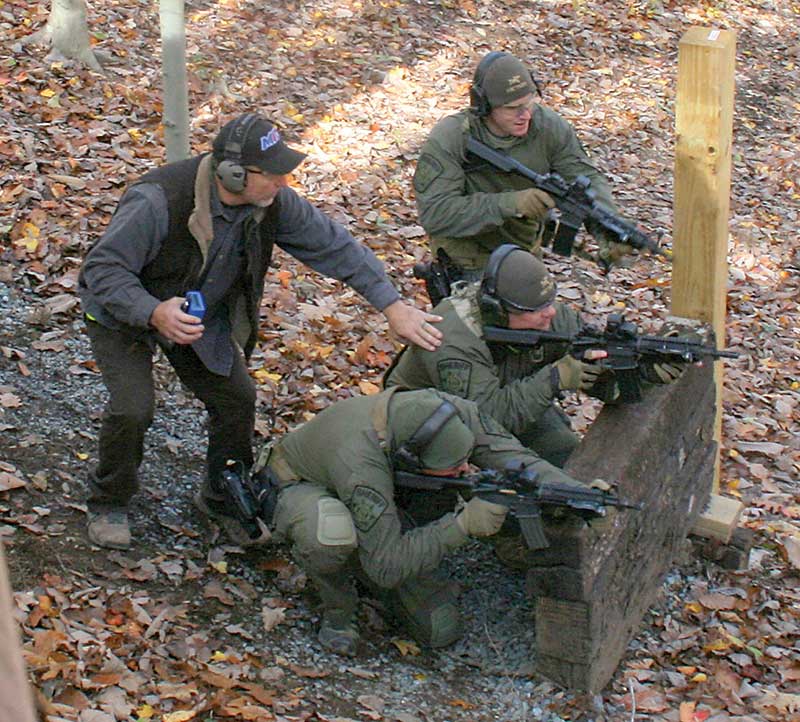Here’s a theoretical case: You’re moving out of your apartment while having “words” with your spouse. She calls a neighbor and tells him you’re throwing things around the room, but you haven’t physically attacked her.
The neighbor rushes over, at which point you’re stomping across the parking lot with a bag of your possessions in hand. Nobody’s hurt. But your neighbor decides it’s still his concern, so he starts questioning you. You tell him to mind his own business. He not only keeps after you, but calls more neighbors to back him up.
When you go inside to get more of your stuff, he pushes into the apartment, despite your vociferous warnings that what he’s doing is illegal and despite the fact that your wife is standing there, obviously unharmed.
When he still doesn’t take the hint, you jack him against the wall and explain it again.
You’re acting within your rights, yes? Most people would probably agree while wishing you’d behaved more civilly to begin with.
Now let’s change the scenario slightly. This time your spouse doesn’t call a neighbor. She calls the police, but she still tells them that you haven’t hurt anything except perhaps her feelings.
You behave exactly the same way toward one of the responding officers. In turn, he behaves exactly like the neighbor mentioned above, calling for backup and pushing into your apartment over your objections—when you have done nothing against the law.
Uh oh. This time you get to meet Messrs. Taser and Handcuffs. And since you have an “adverse reaction” to being tased, you also end up in the hospital.
That second scenario is not theoretical. It happened to a man in Vanderburgh County, Indiana, Richard Barnes. His case ended up in the Indiana Supreme Court, because what the police officers did in entering the apartment was clearly illegal. They had no warrant, were not in hot pursuit, and nobody was destroying evidence.
Guess what the court decided? They decided that none of that mattered. They decreed, “There is no right to reasonably resist unlawful entry by police officers.”
Let’s state right out that Richard Barnes was being an ass, and further acknowledge that what he did was dangerous. The theory of the “right to resist” occasionally comes up on police discussion boards, and the consensus is always that we “civilians” are too uninformed to know what’s legal and what’s illegal. Therefore we should just go along to get along, and let a judge and jury work out the legalities later.
And we “civilians,” who are actually quite well informed of our rights, have to realize that the officer just might not be as knowledgeable as we are—or might not care about our rights.
So yes, resisting an officer, especially in these days of militarized policing, is dangerous and probably stupid.
But in the longer term, unquestioning submission might be even more dangerous and more stupid, both to police and their fellow citizens.
Since the days of the Magna Carta, common law has held that a man’s home is his castle. The state’s power to intrude on your life ends at your doorstep. Furthermore, many court decisions from Britain and the U.S. (particularly in the 19th century) confirm that any ordinary person has an absolute right to resist any officer of the government if he has reason to believe that the officer is acting against the law. In fact, even 50 years ago, courts would most likely have ruled that Richard Barnes not only had a right to slam the officer against the wall and tell him to &^%$ off, but to use any means necessary to defend himself.
Here are a few snippets from the many older court decisions touching on the subject:
- “Citizens may resist unlawful arrest to the point of taking an arresting officer’s life if necessary.”
- “Where the officer is killed in the course of the disorder which naturally accompanies an attempted arrest that is resisted, the law looks with very different eyes upon the transaction, when the officer had the right to make the arrest, from what it does if the officer had no right.”
- “An illegal arrest is an assault and battery. The person so attempted to be restrained of his liberty has the same right to use force in defending himself as he would in repelling any other assault and battery.”
You can find more, complete with cites, at constitution.org/uslaw/defunlaw.htm.
More recently, American courts have moved in the opposite direction. The current standard attitude of police and the courts toward citizens who—under any circumstances whatever—attempt to resist even the most illegal actions of law enforcement officers is that you plain can’t do that.
And of course, there are reasons. Here’s what Justice Steven David of the Indiana Supreme Court wrote in the May 2011 Barnes decision: “We believe…a right to resist an unlawful police entry into a home is against public policy and is incompatible with modern Fourth Amendment jurisprudence. We also find that allowing resistance unnecessarily escalates the level of violence and therefore the risk of injuries to all parties involved without preventing the arrest.” David said a person arrested following an unlawful entry by police still can be released on bail and has plenty of opportunities to protest the illegal entry through the court system. Innocence is no protection.
Columnist William Grigg, who heartily disagrees with Justice David, elaborates: “This includes permitting ourselves to be restrained, arrested, and incarcerated without just cause, on the assumption that the same State that stole our liberty will agree not to take any more of it when the matter is examined in court.”
They say the first rule of contemporary police work is to get home safe at the end of the shift. Nothing acts to promote that perfectly natural desire quite like a doctrine of invulnerability and absolute authority backed by the full force of the state. It has become standard doctrine in most American states that all citizens, guilty or innocent, now have a “duty to submit” to police officers, no matter whether the officers are acting legally or illegally.
Not every American state has gone along with this. Fifty years ago, virtually every state recognized the right to resist. Beginning in the late 1960s, that changed, mostly through judicial activism. Today it’s recognized only in Alabama, Georgia, Louisiana, Maryland, Michigan, Mississippi, North Carolina, Oklahoma, South Carolina, Tennessee, West Virginia, and Wyoming.
But after shrinking for decades, that list has begun to grow. With considerable fanfare, the state of Indiana has added itself. The citizens of Indiana did not take the decision in Barnes Vs. The State lying down. Some of them appealed to their lawmakers.
Legislator Randy Head said the legislature was forced into acting on the issue because the court decision went too far. “Bottom line for me under Barnes,” he stated, “is that it says if a police officer is off duty and breaks into a house, clearly unlawfully, and steals something from that house or hurts someone in that house or sets fire to that house, the homeowner has to say, ‘Officer, stop or I’m going to sue you later.'”
In March 2012, the Indiana Senate passed and Governor Mitch Daniels signed a “right to resist” law that says a person can use “deadly force” against a police officer if that person “reasonably believes” force is necessary to keep the officer from acting illegally.
Proponents call it nothing more than a clarification of the “castle doctrine” already existing in that state. Police spokesmen, predictably, prophesy blood in the gutters. But that has not been the case in those states listed above.
A rebellion against “duty to submit” has been brewing for a long time.
We have somehow come from a tradition of peace officers and Officer Friendly to one of armored cars, “pain compliance devices,” civil asset forfeiture for profit, and a good old-fashioned thumping for having the effrontery to take a cellphone photo of an arrest in progress. Merely having a home address similar to that of some schmoe who’s about to get visited by the War on Drugs can get our doors kicked down in the middle of the night. Knowing most people will just submit, gangs of robbers have taken to bursting violently into homes shouting, “Police!”
Now we have the new and untested National Defense Authorization Act, which says that merely being suspected of terrorism by people in power could get us locked up forever without trial or due process of any kind. No proof of any kind required. Just the word of people in power.
Americans are starting to notice that automatic submission to authority isn’t keeping us either safe or free. Someday we might not even get that reassuring day in court. In a nation that historically defines itself by the principles of freedom and liberty, this cannot go on.
Yes, it’s dangerous to resist armed authorities. On the other hand, no authority that demands cowering submission from its citizens can stand forever. Something’s got to give. Either we end the lip service still paid to freedom, liberty and individual rights, or we restore our rights. Period.
Peace officers are as much the victims of bad policy as anybody. When an escalating series of unjust laws, court decisions, and practices leaves people feeling helpless in the face of authority, sooner or later they’ll start to push back. If they can’t push back peaceably, some will push back violently—and it won’t be the judges and lawmakers they perceive standing between them and their rights. Those guys will be nice and safe in their offices while the rest of us, including frontline peace officers, suffer.






